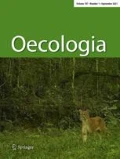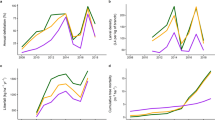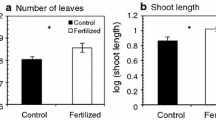Abstract
Large-scale outbreaks of defoliating insects are common in temperate forests. The effects of defoliation on tree physiology are expected to cascade through the entire forest ecosystem, altering carbon, nitrogen, and water fluxes, and subsequently affecting nitrogen cycling and plant-herbivore interactions. If these post-defoliation changes are largely driven by N deficiency, tree root system responses to defoliation should be central to regulating the long-term effects of defoliation; N fertilization should reverse the effects. We examined these phenomena in a 3-year large-scale replicated manipulative field experiment in a hybrid poplar plantation, where we regulated defoliation by gypsy moths as well as nitrogen availability. To our knowledge, this is the first manipulative field experiment at this scale to examine the effects of severe insect defoliation on whole-tree physiology. Defoliation decreased tree growth and increased the rate of top dieback in the stand. Defoliation led to transient declines in carbon allocation to starch in fine roots, trunk, and twigs in the year of heaviest defoliation. Root production and root mortality were unaffected by the heaviest defoliation, but nitrate and ammonium uptake were strongly depressed. N fertilization increased tree growth, but did not alter defoliation effects on starch accumulation or top dieback. Defoliation and fertilization treatments did not interact. In this system, defoliation effects on tree recovery of leaf nitrogen lost to herbivory were primarily driven by effects on nitrogen uptake, rather than effects on root production or mortality.
Similar content being viewed by others
Author information
Authors and Affiliations
Additional information
Electronic Publication
Rights and permissions
About this article
Cite this article
Kosola, K.R., Dickmann, D.I., Paul, E.A. et al. Repeated insect defoliation effects on growth, nitrogen acquisition, carbohydrates, and root demography of poplars. Oecologia 129, 65–74 (2001). https://doi.org/10.1007/s004420100694
Received:
Accepted:
Published:
Issue Date:
DOI: https://doi.org/10.1007/s004420100694




